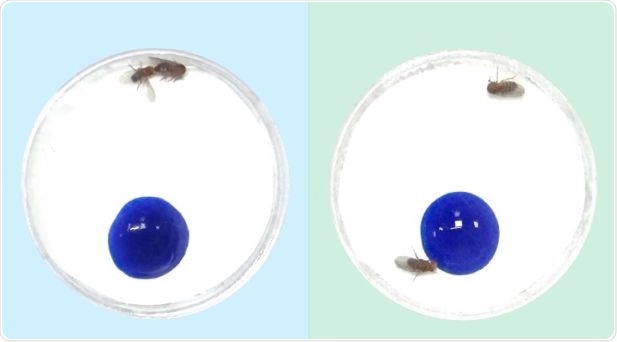According to scientists from the University of Birmingham, people tend to prioritize food over sex after being deprived of both. The researchers examined this behavioral conflict in fruit flies.

Drosophila on the left court after feeding. A hungry drosophila in the right-hand dish chooses to prioritize food. Image Credit: University of Birmingham.
The research identified the precise neuronal impulses stimulated in flies’ brains when encountered with the critical choices of feeding or mating. The research and its findings have been published in the Current Biology journal.
Drosophila, or fruit flies, are widely employed in neuroscience studies and help understand how complex brains behave. Drosophila shows complex behaviors like learning and memory; however, these are controlled by a relatively simpler brain, with only about 100,000 neurons. Comparatively, the human brain contains around 86 billion neurons.
We are often exposed to conflicting situations where we must prioritize one goal over others. For an animal in nature, this could mean having to choose between feeding, mating, or fighting for resources. How does the animal know what to do?”
Dr Carolina Rezaval, Research Team Leader, University of Birmingham
“The fruit fly Drosophila is a great experimental system to understand how crucial behavioral decisions are made in the brain. We can identify neural elements that direct behaviors with great resolution and decipher the underlying mechanisms,” added Dr. Rezaval.
The knowledge researchers gain in the lab may reveal fundamental mechanisms underlying decision-making that might be common to many species, but are difficult to study in mammalian experimental systems.”
Sherry Cheriyamkunnel, School of Biosciences, University of Birmingham
Sherry Cheriyamkunnel is one of the key contributors to the research and is a former Master’s student of Dr. Rezaval.
The researchers kept male flies away from both food and females and later provided a choice of both. They observed that mating was consistently overridden by hunger in flies that were starved, with the behavioral tipping point appearing after about 15 hours of starvation. When fed, the male flies were found to turn their attention to courtship—probably within just a few seconds.
The researchers employed genetic tools to label neurons in the brain with fluorescent markers. Then, they turned off or on some neurons and analyzed the effects on behavior. Employing these tools, they wondered how the brain of the fly responds to the availability of conflicting options, and how it determines which one to choose.
The researchers worked with the laboratory of Professor Scott Waddell at the University of Oxford and used an approach named two-photon calcium imaging to monitor the neurons in the brain of live flies. The technique allowed them to identify activated neurons in the flies’ brains as they made decisions about which one to prioritize.
The neurons that tell the fly to go and eat, or to go and mate, are essentially competing with each other. If the need to eat is most urgent, the feeding neurons will take over, if the threat of starvation is less, then the urge to reproduce will win.”
Dr Carolina Rezaval, Research Team Leader, University of Birmingham
The scientists also observed that behavioral choice is not absolutely fixed and is affected by context. For instance, even when feeding was prioritized when the fly was low on energy, the decision can also be affected by the quality of food, with flies rejecting bad food and choosing to mate, even when hungry.
“We have so much more still to learn from the fruit fly, for example, what happens when other threats are introduced – how would the fly decide whether to feed or escape from a predator, or what would happen if a female fruit fly were confronted with similar choices? All these insights help us to build up a picture of complex decision-making in the brain,” says Saloni Rose, a Ph.D. student and one of the main contributors to the study.
With a deeper understanding of general brain mechanisms, scientists can ultimately understand the working of more complex brains and what happens when they go wrong in conditions like addiction, Alzheimer’s, or Parkinson’s Disease that affect the decision-making processes in the brain.
Source:
Journal reference:
Cheriyamkunnel, S. J., et al. (2021) A neuronal mechanism controlling the choice between feeding and sexual behaviors in Drosophila. Current Biology. doi.org/10.1016/j.cub.2021.07.029.